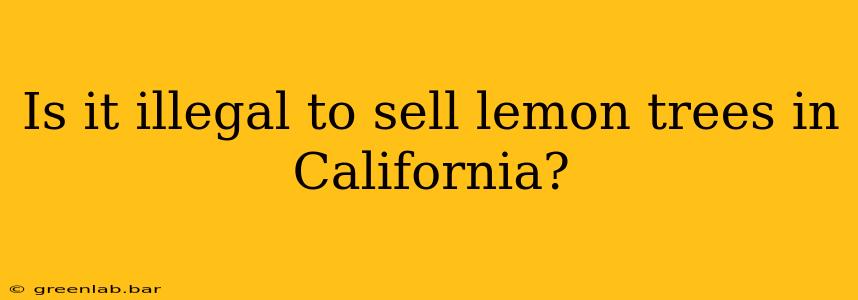Is It Illegal to Sell Lemon Trees in California? A Deep Dive into Citrus Sales Regulations
The question of whether it's illegal to sell lemon trees in California isn't a simple yes or no. While there isn't a blanket ban on selling lemon trees, the legality hinges on several factors, primarily revolving around the prevention of the spread of citrus diseases. California's citrus industry is a significant part of its agricultural economy, and protecting it from devastating diseases is paramount.
This article will explore the regulations surrounding the sale of lemon trees and other citrus plants in California, offering a comprehensive understanding of the legal landscape for growers, nurseries, and consumers.
Understanding California's Citrus Health Regulations
The California Department of Food and Agriculture (CDFA) plays a crucial role in regulating the citrus industry to safeguard its health. Their primary concern is preventing the spread of harmful pests and diseases, such as Huanglongbing (HLB), also known as citrus greening disease. HLB is a devastating bacterial disease that can wipe out entire groves. Because of the severity of this threat, regulations surrounding the propagation and sale of citrus plants are quite stringent.
The Role of Nurseries and Growers
Nurseries and growers selling citrus trees in California must adhere to specific regulations to ensure the health of their plants. These regulations often involve:
- Quarantine Procedures: Nurseries might need to quarantine newly acquired citrus plants to monitor for diseases before they are sold. This is a vital step in preventing the spread of infections.
- Certification Programs: Participation in state-approved certification programs can demonstrate compliance with disease prevention standards. These programs often involve rigorous inspections and testing.
- Proper Handling and Transportation: Safe handling and transportation of citrus plants are essential to avoid the accidental spread of diseases. This includes proper packaging and avoiding cross-contamination.
- Disease Monitoring and Reporting: Growers and nurseries are often required to actively monitor their plants for signs of disease and report any suspicious findings to the CDFA immediately. This proactive approach is critical to containing outbreaks.
Implications for Consumers
While the regulations primarily impact nurseries and growers, consumers should also be aware of potential implications. Buying citrus trees from uncertified sources could inadvertently introduce diseases into the state. Therefore, it's crucial to:
- Buy from Reputable Sources: Purchase citrus trees only from licensed nurseries known for their adherence to disease prevention protocols. Checking for certifications is highly recommended.
- Inspect Plants Carefully: Before purchasing, carefully examine the plants for any signs of disease or pest infestation. Report anything suspicious to the nursery or the CDFA.
- Understand Transportation Restrictions: There may be restrictions on transporting citrus plants across county lines or state borders, particularly if they're not certified disease-free.
Penalties for Non-Compliance
Failure to comply with California's citrus regulations can lead to significant penalties, including fines and the destruction of infected plants. The severity of the penalties depends on the nature of the violation and the potential risk to the state's citrus industry.
Conclusion: Legality Depends on Compliance
Selling lemon trees in California is not inherently illegal, but it's crucial to comply with the regulations set by the CDFA. Growers, nurseries, and consumers all have a responsibility to protect the state's citrus industry by adhering to these guidelines and prioritizing disease prevention. By choosing reputable sources and understanding the regulations, you can contribute to the health and sustainability of California's citrus groves. Remember to always check with your local agricultural authorities for the most up-to-date information and specific regulations in your area.

